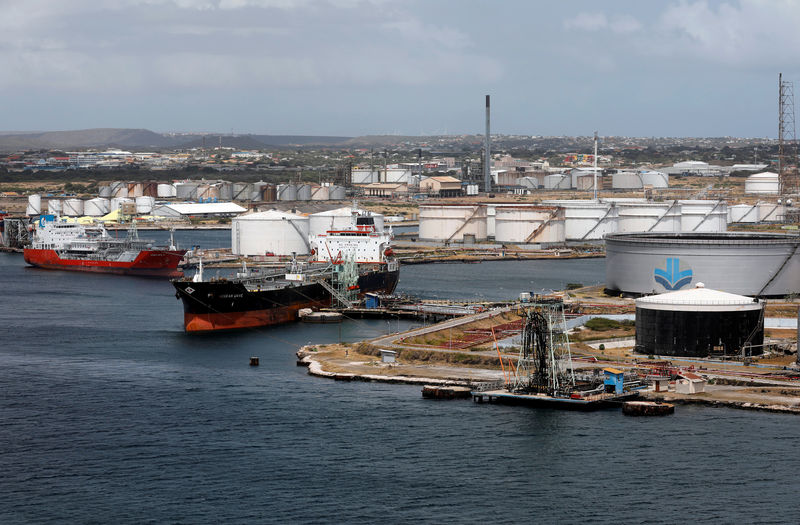By Marianna Parraga
(Reuters) - The top U.S. buyers of Venezuelan oil are in the unusual position of trying to return millions of barrels of crude they need but cannot accept because of U.S. sanctions on the South American nation and its state-run energy firm PDVSA.
PDVSA's U.S. refining subsidiary Citgo Petroleum Corp and Valero Energy (NYSE:VLO) are proposing to return 2 million barrels of crude loaded before sanctions, while a third U.S. oil company, Chevron Corp (NYSE:CVX), has sought so far unsuccessfully to legally pay for 4.3 million barrels, according to an internal PDVSA document seen by Reuters.
In effect, more than 6 million barrels of Venezuelan crude remain in limbo as a result of U.S. sanctions imposed on Jan. 28 by Washington in an effort to oust President Nicolas Maduro. The United States and dozens of other nations recognised opposition leader Juan Guaido as the nation's legitimate leader.
To comply with U.S. sanctions, Valero, Citgo and others are not allowed to pay PDVSA. Guaido's administration has yet to establish its own bank accounts to receive proceeds from oil sales to U.S. customers, leaving those shipments stranded.
Overall oil exports from the OPEC member state dropped by about 40 percent in the first full month of sanctions, as the U.S. sought to cut oil revenue to Maduro, who presides over a nation beset by a years-long economic crisis, with millions fleeing for a lack of food and medicine.
PDVSA, Citgo and Valero did not reply to requests for comment. Chevron does not comment on supply and trade matters, a spokesman said.
STRANDED TANKERS
The standoff has stranded some 6.4 million barrels of Venezuelan heavy crude onboard 11 tankers originally destined for the United States, as they have not been authorized to set sail. The vessels fell into limbo because PDVSA demanded prepayment for the cargos after sanctions were imposed, which U.S. firms cannot do.
Chevron, the second-largest U.S. oil firm by market value, wanted to take the oil shipments in lieu of loans and dividends stemming from joint ventures with PDVSA, a person close to the matter said. The cargoes were loaded at Venezuelan ports ahead of sanctions, but they remain undelivered, according to the document, and it is unclear if PDVSA would accept that offer.
Valero proposed to pay PDVSA for 1.05 million barrels of Venezuelan oil, but that request was rejected by the U.S. Office of Foreign Assets Control (OFAC), which oversees sanctions, the documents said.
The Houston-based Citgo cut ties with its parent company in compliance with U.S. measures that halted its purchases of PDVSA's oil, the documents said.
A U.S. Treasury spokesperson declined to comment on the requests to pay PDVSA for the cargoes.
As of March 8, the 11 loaded vessels remained anchored off ports in Venezuela. Two other Chevron-chartered cargoes were stuck off the U.S. Gulf Coast and a third was returned to Venezuela's Amuay terminal, according to Refinitiv Eikon vessel-tracking data.
PDVSA does not expect Citgo or Valero to accept the cargos and intends to "commercially reallocate the volumes onboard so tankers can be freed," a Feb. 21 trade and supply document showed. The same document expressed worry over demurrage fees - the daily cost for storing the oil on tankers - which have been accumulating for over a month.
PDVSA SCRAMBLES TO AVOID EXPORT SHORTFALL
Separately, a days-long blackout across the country has halted exports from Jose port, the nation's primary crude export terminal. PDVSA on Monday was trying to restart operations.
The Venezuelan company has been forced to redesign its production and export logistics in recent weeks to avoid halting operations, including formulating new crude blends, swapping a large portion of its oil for imported fuel, selling through intermediaries and finding new customers.
But the efforts have not been enough to avoid an export decline. The OPEC-member country's oil shipments fell to some 920,000 barrels per day (bpd) in February according to Refinitiv Eikon data.
PDVSA exports could fall further due to a lack of imported naphtha, a light distillate, needed to dilute its extra heavy oil as the company has been able to secure only two 500,000-barrel cargoes versus 2-3 million barrels per month needed, according to the document.
If it cannot import enough naphtha to formulate its oil for export, PDVSA plans to start mixing other domestic fuels to ready oil for export.
Lack of maritime crews to take PDVSA tankers idled due to unpaid shipping fees is also hampering oil deliveries between domestic ports and to the Caribbean, where PDVSA stores and ships much of its export barrels.
Some shipping firms' reluctance to work in Venezuela after sanctions have stopped PDVSA from using leased tankers to ease storage bottlenecks at its Orinoco Belt's joint ventures. The ones willing to work with PDVSA are charging high prices and extra fees, the document added.

On March 4, PDVSA completely shut output at its Corocoro oilfield, which was producing some 12,000 bpd, due to lack of storage capacity. Its Pedernales oilfield could follow due to similar issues, according to the report. The four Orinoco upgraders were working at minimum on Monday.